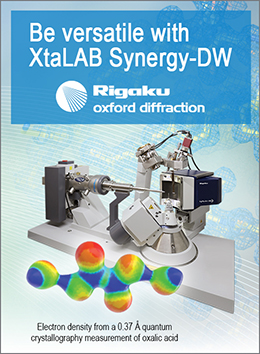
Meeting report (IUCr supported)
Students from 21 countries gathered for the AIC International Crystallography School 2018
![AICS2018 group [AICS2018 group]](https://www.iucr.org/__data/assets/image/0015/141243/AICS2018-group.jpg)
Participants at the AIC International Crystallography School 2018.
The Italian Crystallographic Association (AIC) International Crystallography School 2018 (AICS2018) on 'Powder diffraction: Theory, Software and Applications' was held in Bari, Italy, from 29 August to 2 September 2018. The school was organised by the AIC Commission on Crystallographic Teaching (Serena C. Tarantino, coordinator; Paolo Lotti; Chiara Massera; Paolo P. Mazzeo) in collaboration with the Institute of Crystallography of the Italian Research Council (CNR-IC) and the Department of Earth and Geo-environmental Sciences of the University of Bari (DSTG-UniBA). The Programme Committee was chaired by Angela Altomare (CNR-IC) and Emanuela Schingaro (DSTG-UniBA), while the Organising Committee was chaired by Anna Moliterni (CNR-IC) and Gennaro Ventruti (DSTG-UniBA).
The School had a strong international character. It was in fact attended by 69 students from 21 countries (Italy, Albania, Algeria, Belgium, China, Croatia, Czech Republic, Denmark, Egypt, France, Germany, India, Ireland, Malaysia, Morocco, Norway, Poland, Romania, Russia, Sweden and Tunisia; over 60% from outside Italy) and different scientific backgrounds (chemistry, mineralogy, material sciences, pharmaceutical sciences), and by 19 invited lecturers and organisers. Four representatives of the supporting institutions and sponsors (IUCr, Dectris, ICDD, Assing) were also present.
![[AICS2018 associate]](https://www.iucr.org/__data/assets/image/0008/142577/AICS2018-associate.jpg) IUCr Executive Outreach Officer Michele Zema (left) congratulates Paolo Mazzeo on becoming an IUCr Individual Associate during AICS2018. Paolo’s contribution will help the IUCr to continue to sponsor such schools, bringing crystallographic training to all parts of the world.
IUCr Executive Outreach Officer Michele Zema (left) congratulates Paolo Mazzeo on becoming an IUCr Individual Associate during AICS2018. Paolo’s contribution will help the IUCr to continue to sponsor such schools, bringing crystallographic training to all parts of the world.
The IUCr was represented by its Executive Outreach Officer, Michele Zema. In his speech at the opening ceremony, in the presence of Antonio Felice Uricchio, Rector of the University of Bari; Michele Saviano, Director of the CNR-IC; and Pierfrancesco Dellino, Director of the DSTG-UniBA, he emphasised the importance of international cooperation in science, well addressed by the AICS2018. Michele also staffed the IUCr stand, giving information about publishing with the IUCr Journals and promoting the new IUCr Associates Programme.
The AICS series has a long-standing tradition dating back to 1972, and schools are held on an annual basis in a different venue in Italy (some venues, like Perugia and Camerino, have hosted several editions) and on a different topic. There is a strong financial effort of the association, in line with its mission of promoting education and the diffusion of crystallography.
For AICS2018, in addition to the important financial contribution of AIC, the other partner institutions, DSTG-UniBA and CNR-IC, have supported the School economically. The School has also received generous support from the IUCr and numerous commercial companies (ICDD; Dectris; Malvern Panalytical; GNR; Crystal Impact; Anton Paar; Crystals; Assing-Rigaku; Bruker AXS; Sanofi) that participated as sponsors. Thanks to the contributions of organising institutions and sponsors, 44 scholarships were granted for partial or total coverage of the registration fee.
The scientific programme of AICS2018 has addressed the different aspects of the structural study by powder diffraction methods. The school days were divided into sessions dedicated to the different phases of structural analysis: phase recognition; pattern indexing; space-group determination; structural solution in real and reciprocal space; Rietveld refinement; microstructural and textural study through profile analysis; applications in different scientific and industrial fields.
The school programme included 20 hours of lectures and 13 hours of practical sessions. The following specialists presented lectures at the school: Gilberto Artioli (University of Padua, Italy); Radovan Černý (University of Geneva, Switzerland); Nicola Corriero (IC-CNR Bari, Italy); Giuseppe Cruciani (University of Ferrara, Italy); Corrado Cuocci (IC-CNR Bari, Italy); Aurelia Falcicchio (IC-CNR Bari, Italy); Andrew N. Fitch (ESRF, Grenoble, France); Elena Kabova (University of Reading, UK); Bruno Lanson (ISTerre, Université Grenoble Alpes, Grenoble, France); Matteo Leoni (University of Trento, Italy); Paolo P. Mazzeo (University of Parma, Italy); Ernesto Mesto (University of Bari, Italy); Anna Moliterni (IC-CNR Bari, Italy); Jasminka Popović (Ruđer Bošković Institute, Zagreb, Croatia); Rosanna Rizzi (IC-CNR Bari, Italy); Juan Rodríguez-Carvajal (Institute Laue Langevin, Grenoble, France); Dubravka Šišak Jung (DECTRIS Ltd, Baden-Daettwil, Switzerland); Željko Skoko (University of Zagreb, Croatia); Gennaro Ventruti (University of Bari, Italy).
During the closing ceremony, several prizes were awarded to students, including the IUCr Young Scientist Awards to 11 students, who were offered partial coverage of travel and subsistence expenses. Other awards were provided by ICDD, Bruker and Malvern Panalytical.
An anonymous evaluation form was provided for the students to give their own opinions on different aspects of the school. The large majority of comments were positive and some helpful remarks were given that will help in the organisation of future schools.
The teaching method, based on lectures and tutorials on the use of pertinent software, is a hallmark of AIC schools. We have experienced that the distribution of a Lecture Notes booklet, where students can take notes directly on the slides of the lectures, is a helpful strategy to assist in their understanding. A teacher/student ratio of at least 1:5 allows profitable interaction and encourages students to relate and have discussions with teachers. When hands-on sessions are involved, students are invited to bring their own laptop and are provided with installation and working files before the school starts, so that they are ready for the tutorials beforehand and go on practising even after the school.
The AIC School is now adjourned to the 2019 edition in Naples on 30 August to 4 September 2019 for the Crystallographic Information Fiesta, an intensive course in Crystallographic Information, covering the extraction, dissemination and use of scientific knowledge from the structure determination experiment to database-driven discovery.
Copyright © - All Rights Reserved - International Union of Crystallography








